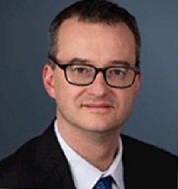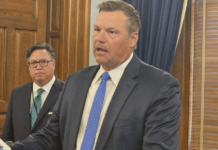Gov. Laura Kelly’s nominee to the Kansas Court of Appeals on Tuesday deflected suggestions that he advocated for legalizing marijuana and that no drug convictions should carry a prison sentence.
Republican Sen. Julia Lynn raised the issue during the confirmation hearing Tuesday for federal public defender Carl Folsom III before the Senate Judiciary Committee. The Senate is expected to act on the nomination at this week’s special session.

Lynn said she understood that Folsom had said he supported legalizing marijuana and that drug offenders should not be sentenced to prison during a drug policy conference in 2018 on the University of Kansas campus.
“I don’t believe that is a correct explanation of what I said there,” Folsom told the committee. “I would have to look at a transcript. I don’t believe I said those things.”
Folsom said he was invited to participate in the conference because of his particular expertise in federal drug cases.
“I remember the core tenets of my message being that mandatory minimums for sentencing, particularly in the federal system, was excessively punitive.”
Folsom noted that since he participated in that forum, the federal government has since lowered the mandatory minimum sentences in drug cases.
“I do not recall advocating for the legalization of marijuana,” he said. “It might be an issue that comes up in Kansas, but I do not recall advocating for that.”
Lynn pressed Folsom on whether he said he believed that no drug convictions should carry a prison sentence because they are nonviolent crimes.
“I don’t recall making those statements,” he said. “I do remember saying that when someone is taken and put in prison for a nonviolent crime, they are taken away from their family and sometimes it could cause additional problems.”
Folsom has seen the dire results of drug abuse.
“I don’t know that I would have taken that position. I don’t recall the exact statements that you are referring to.”
Lynn followed up, asking Folsom how serious a drug crime has to be to send someone to prison.
“That’s really a question for the Legislature,” he said. “I have extreme respect for this body. I don’t think it would be proper for me to comment on that.”
Lynn also quizzed Folsom about his defense of a client who pled guilty to one count of child pornography in Oklahoma about eight years ago and was sentenced to 120 months in prison followed by five months of supervised release.
The FBI discovered more than 20,000 images depicting child pornography on the client’s computer, including images of children between 5 and 14 years old.
Folsom was one of the lawyers who appealed the sentence, which also barred his client from using or possessing a computer without permission of his probation officers and owning or possessing a camera.
Lynn asked Folsom whether he advocated in that case that a sex offense with an underage child was not a violent crime and should not receive an enhanced sentence.
Folsom said the Oklahoma case involved possession of child pornography, not a physical act. He did not have permission to discuss the case from his client.
“I don’t believe that I ever advocated that,” he said. “I would not take that position.”
Folsom added that there are times when he’s in a position as a public defender when he has to define particular legal terms to make his case.
“I don’t remember all the details of that case,” he said. “But I can tell you that in my personal view obviously, in a general sense, raping a 5-year-old is definitely a violent act.”
As a defense lawyer, Folsom said he could have been in a position to ask a judge to do something he doesn’t agree with.
“It is something that as a defense attorney, that’s my obligation,” he said.
“If there is an opportunity to make an argument to help the defendant…I would be unethical if I left that argument off the table that could have possible saved them a year or two in prison.”
Sen. Molly Baumgardner questioned how that Oklahoma case affected Folsom’s ability to be impartial as a judge.
“I’ve represented hundreds of defendants over the years, and some of them have done some really bad things,” Folsom said.
Folsom said he handled the appeal of the case and only advanced arguments that were made at the trial level.
“I really don’t think it’s going to affect my impartiality at all,” he said.
“My judicial philosophy is really about the process and making sure that the process is fair to all parties that go before (the court), whether it’s a criminal case, whether it’s a civil case, family law, whatever type of case it is,” he said.
















